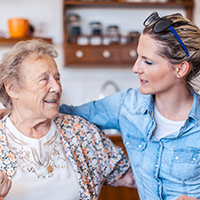Find out more about your options for cancer surgery, get a second opinion
or make an appointment with one of our specialists.
Psycho-Oncology
Beyond the physical symptoms and pain, cancer diagnosis often brings a jumble of emotions and stress for you and your loved ones.
Expert Counselors to Help You Cope
Get expert, personalized counseling services and supportive care to help you and your family network cope with a cancer diagnosis.
Symptoms of Stress & Distress
At OU Health Stephenson Cancer Center in Oklahoma, you can take advantage of extensive services from a team of highly trained psycho-oncology providers and cancer specialists who help you deal with a wide range of emotional, mental or behavioral distress such as:
-
Anger and irritability
-
Anxiety, panic or worry
-
Feelings of loss of control
-
Loneliness and isolation
-
Loss of interest in most activities
-
Pulling away from friends and family
-
Sadness and depression
-
Sleep problems and fatigue
-
Thoughts of death or suicide
Get Help for Emotional Crisis
If you or a loved one feel like you’re in an emotional crisis – call 9-1-1 now or go to the nearest emergency room.
Request an appointment to visit with a psycho-oncology specialist in cancer
supportive care at OU Health Stephenson Cancer Center.
Call
(405) 271-4385
Emotional Wellness During Cancer
Sometimes, emotions need extra support and attention. In addition to physical health concerns, the feelings of sadness, fear, worry and loss may accompany a cancer diagnosis. Consider talking with your OU Health professional Supportive Care team or provider if you:
-
Experience regular sadness, irritability or loss of interest for two weeks or longer
-
Think about taking your own life or physically harming yourself
-
Need to use alcohol or drugs to feel better
-
Find that feelings or thoughts interfere with your medical treatment
-
Can’t sleep or don’t feel a need to sleep for several days in a row
-
Have a history of mental health conditions that are getting worse or are not currently being treated
Self-Care for Emotional Wellness
At any point during treatment and recovery, you may experience unwanted changes in emotions, behavior or concentration. Keeping emotional balance can help you make effective decisions, maintain a good quality of life and feel more like yourself as you move through the cancer journey. You can help yourself stay on track by boosting your self-care with these suggestions:
-
Stay informed – Gather information about symptoms and services to help you regain a sense of control and improve decision making; avoid getting bogged down by limiting your search to doctors and nurses you know or 2-3 reputable websites or written materials
-
Talk it out – Communicate your needs directly because doctors and loved ones can’t read minds; be specific; bring your questions to each visit; remember to ask for clarification or say when you don’t understand
-
Accept help – Prevent exhaustion and burnout by accepting genuine offers of help from friends, family or your community such as meals, transportation, yard work, pet sitting, housecleaning, medication pickup and more
-
Stay connected – Keep in touch with friends and family or create new connections through support groups; use phone calls, email or social media if you can’t leave home
-
Move more – Rebuild strength and reduce stress or depression with even small amounts of physical activity; ask your doctor about any restrictions
-
Meditate – Develop a daily practice of deep breathing, mindfulness meditation or imagery to boost mood and improve sleep, thinking and physical health
-
Get creative – Release negative thoughts or feelings through writing or other creative arts such as drawing, painting, journaling, knitting, jewelry making and more; contact your local craft store for information or search the internet for easy how-to videos
Related OU Health Services
Talk with your Supportive Care team for guidance, counseling and services to address all types of complex medical decisions, sexual health concerns, assistance with advance directives or a living will, advanced care options, financial concerns and much more.
Find out more about cancer palliative care and other palliative and comfort care services, as well as pain management services at OU Health.
Your Supportive Care Team
Throughout your journey at OU Health Stephenson Cancer Center, you can depend on your Supportive Care team to walk with you every step of the way. You’ll work with professionals from many healthcare disciplines, including palliative care providers, psychologists, psychiatrists, genetic counselors, clinical social workers, case managers, oncology dietitians, physical therapists, occupational therapists, cancer navigators, American Indian navigators and tobacco cessation counselors, as well as other helpful clinicians and support staff.



-
 April 23 Gynecologic Cancers Support Group - Hope in Oklahoma
April 23 Gynecologic Cancers Support Group - Hope in OklahomaJoin us for the Hope in Oklahoma — Gynecologic Cancers Support Group where we discuss treatment, the ...
View Event Details -
 April 24 Pancreatic Cancer Support Group
April 24 Pancreatic Cancer Support GroupLast Thursday of the month, 6 p.m.- 7 p.m. Living Room Lobby, Stephenson Cancer Center Contact: Mike ...
View Event Details -
 April 25 Spanish-Speaking Cancer Support Group
April 25 Spanish-Speaking Cancer Support GroupLast Friday of the month, 5 - 6:30 p.m. Conference Room 5058, Stephenson Cancer Center Contact: Carmen ...
View Event Details -
 May 02 Project 31 Breast Cancer Support Group
May 02 Project 31 Breast Cancer Support GroupJoin our support group and meet other survivors, hear from guest speakers, ask questions, learn, share ...
View Event Details -
 May 02 Shair Mobile Wig Salon (OKC)
May 02 Shair Mobile Wig Salon (OKC)The Shair mobile wig salon will be parked outside of OU Health Stephenson Cancer Center on the first ...
View Event Details -
 May 03 Lung Cancer Screening Day
May 03 Lung Cancer Screening DayStop by OU Health Stephenson Cancer Center to walk through your eligibility for screening, learn more ...
View Event Details -
 May 06 Cellular Therapy and Bone Marrow Transplant Gathering
May 06 Cellular Therapy and Bone Marrow Transplant GatheringJoin us for a cellular therapy and bone marrow transplant support group where we create a community ...
View Event Details -
 May 08 Brain Tumor Support Group View Event Details
May 08 Brain Tumor Support Group View Event Details
-
OU Health Hematologist-Oncologist Receives Award to Study Rare Type of Sarcoma
Abdul Rafeh Naqash, M.D., a hematologist-oncologist with OU Health Stephenson Cancer Center at the University of Oklahoma Health Sciences Center, has ...
Read More -
TSET Health Promotion Research Center Expands Their Team
Three faculty members have joined the TSET Health Promotion Research Center at the University of Oklahoma Health Sciences Center: Katelyn Romm, Ph.D.; ...
Read More







.png)


